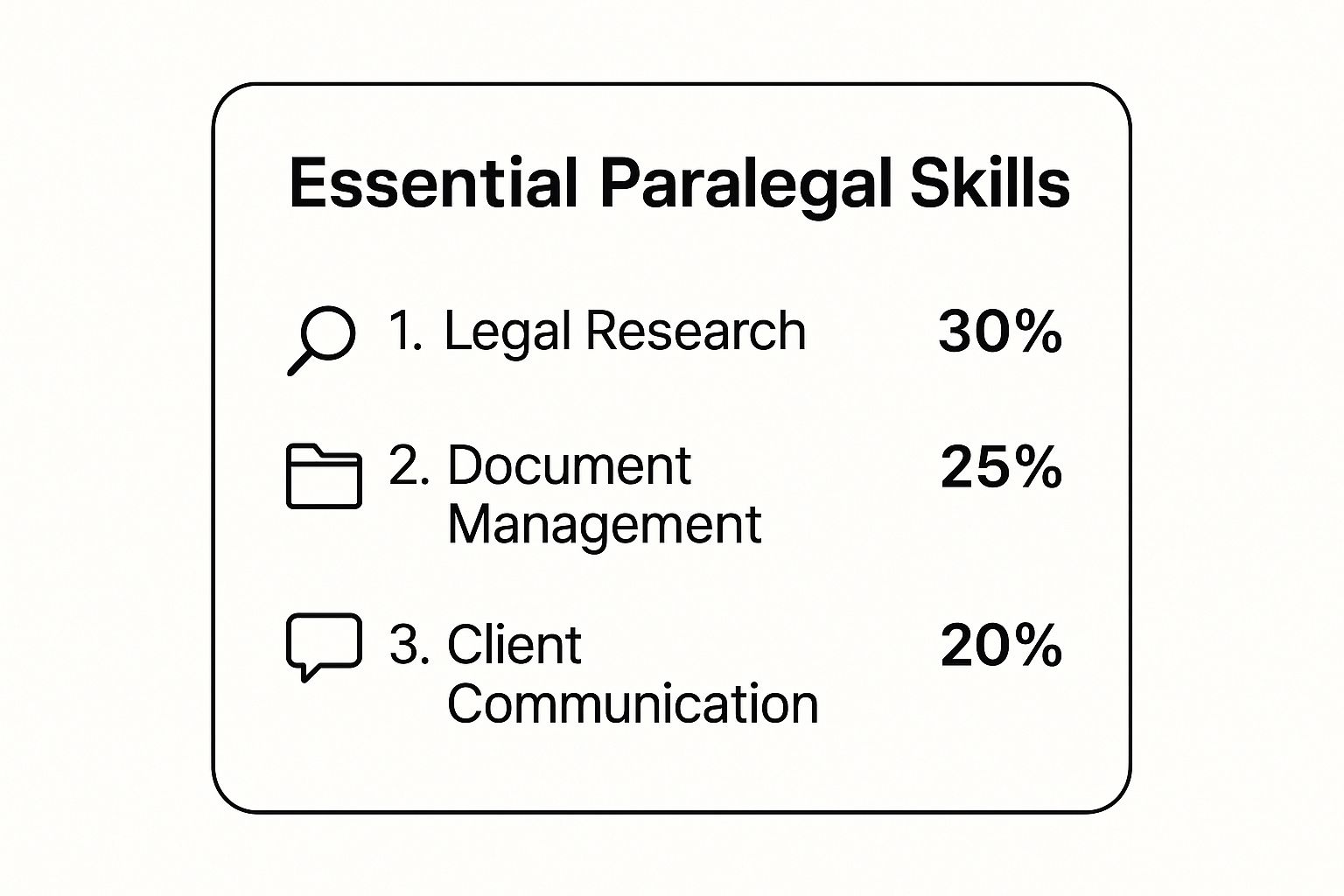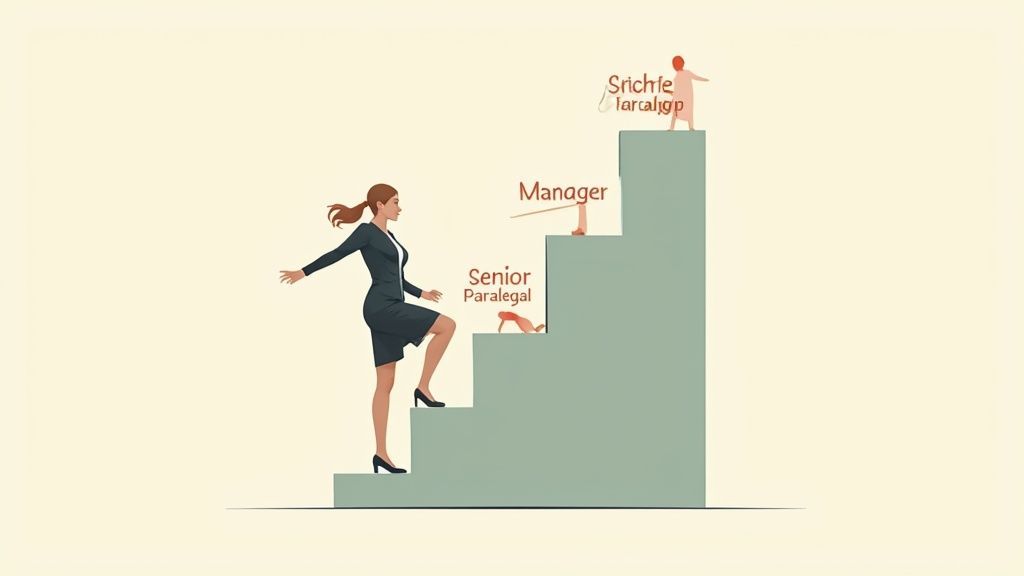
 22 minutes read
22 minutes read
So, you're thinking about becoming a paralegal. Smart move. This role is the absolute backbone of any law practice that actually wins cases, blending high-stakes legal work with the quiet satisfaction of making order out of pure, unadulterated chaos.
But forget the TV dramas for a second. A truly great paralegal isn't just an assistant; they're the strategic operator who ensures the entire legal machine runs without a single, catastrophic hitch. Let's get into what that really means.

Let's get straight to the point: Is being a paralegal just a glorified admin job? Not even close. If that’s what you think, you’re in for a rude awakening. If you enjoy a mix of detective work and managing controlled chaos, you're in the right place.
A paralegal is the attorney's right hand, often knowing the case file better than anyone else in the room. You’re not just filing papers; you’re the project manager for complex litigation, the researcher digging for that one critical piece of evidence, and the person who guarantees every deadline is met without someone having a meltdown. It’s a role that demands a unique blend of militant organization and creative problem-solving.
One day you might be drafting discovery requests that could literally make or break a case. The next, you're coordinating with expert witnesses or putting together trial binders so meticulously organized that an attorney could find Exhibit 47B blindfolded. In a tornado.
You become the keeper of facts, the master of schedules, and the calm in the storm.
Here’s a taste of what your week could involve:
This isn’t about just ticking off boxes on a to-do list. It’s about anticipating what the attorney needs three steps before they even have to ask. That’s what separates a decent paralegal from an indispensable one.

The best paralegals operate with a founder's mentality. They don’t just execute tasks; they own the outcome. They see the entire case as their project and take responsibility for its smooth operation from start to finish. We’re talking extreme ownership.
The demand for sharp, skilled paralegals is no secret—it’s a clear trend backed by solid data. In other words, this is a real job with real security.
Here's a quick summary of the key metrics defining the paralegal profession right now.
| Metric | Key Figure | What This Means for You |
|---|---|---|
| Projected Job Growth | 12% by 2030 | This is significantly faster than the average for all occupations. Translation: strong job security. |
| New Openings Annually | Approx. 43,000 | A ton of openings means you have options. You don't have to settle for a firm you hate. |
| Median Annual Salary | $56,230 | A solid starting point, with serious room for growth once you prove you're not a liability. |
| Top 10% Salary | Over $90,000 | Specializing in high-demand areas like corporate law or IP can lead to a very lucrative career. |
These numbers tell a compelling story. It’s a field where your expertise is recognized and rewarded. You can dive deeper into the paralegal job outlook and its promising growth on the U.S. Bureau of Labor Statistics website, if you're into that sort of thing.
Ultimately, to work as a paralegal is to be a critical thinker and a master organizer. You're not just supporting a legal team—you are a vital part of its success. No pressure.
Alright, let’s talk credentials. Anyone telling you there’s only one path to become a paralegal is either selling something or hasn't been in the trenches long enough. The truth is, your education and certifications are your tools—you need to pick the right one for the job you actually want.
Spending four years and a mountain of cash on a bachelor’s degree when a certificate could get you hired faster isn’t a strategy; it’s a financial headache. Don’t do that.
Let's cut through the academic noise. Each educational path has a distinct purpose, and choosing the wrong one can mean wasting years you could have spent gaining actual, paid experience. The goal isn't the fanciest diploma; it's the fastest, most effective route to a paycheck and a career you don't hate.
I’ve seen paralegals with a simple certificate run circles around those with a full bachelor’s because they focused on practical skills over abstract theory. The real world doesn't care about your thesis on 18th-century maritime law.
Here’s my take on the options, based on years of hiring legal professionals:
The Certificate: This is your express lane into the profession. If you already have a bachelor's degree in another field—say, history or communications—a post-baccalaureate certificate is a laser-focused way to add the necessary legal skills without starting from scratch. It’s quick, cost-effective, and shows employers you’re serious. This is my preferred route for career-changers.
The Associate's Degree (A.A. or A.A.S.): This is the workhorse of the paralegal world. A two-year program gives you a solid foundation in legal principles, research, and ethics. It’s often the most direct path for someone coming straight from high school, providing a credential that hiring managers recognize and respect. Solid, but not flashy.
The Bachelor's Degree (B.A. or B.S.): Is it necessary? For most entry-level jobs, no. Is it valuable? Absolutely, especially if you’re aiming for a top-tier corporate legal department or a specialized, high-paying niche. A four-year degree often sharpens your critical thinking and writing skills—pure gold in this field. Just be sure the debt is worth the payoff.
This image breaks down the essential paralegal skills that any good educational program should arm you with. If your program isn't teaching you this stuff, run.

As you can see, core competencies like legal research and document management form the foundation of a paralegal's daily work, which is why practical, hands-on training is so critical.
Now for the next hurdle: professional certifications. These are different from the certificate you earn from a school. We're talking about credentials from national organizations like NALA (the National Association of Legal Assistants) or the NFPA (National Federation of Paralegal Associations).
Think of it this way: your degree gets you the interview, but a professional certification can be the tiebreaker that gets you the offer. It signals a level of commitment and standardized knowledge that makes a hiring partner’s job easier. They see "Certified Paralegal" (CP) or "Registered Paralegal" (RP) and instantly know you’ve passed a rigorous exam. It's a stamp of approval.

Is certification mandatory to work as a paralegal? In most states, no. Does it make you a more competitive and potentially higher-paid candidate? You bet it does. It’s one of the clearest ways to show you’re invested in your career long-term.
So, should you get one? If you’re serious about career growth, the answer is a resounding yes. It opens doors, especially in competitive markets. For a deeper dive, you can learn more about specific paralegal certification requirements and figure out which one aligns with your goals.
Ultimately, your path is your own. Don't let anyone sell you on a one-size-fits-all solution. Analyze where you want to go, then build the foundation to get you there efficiently. Wasting time on credentials you don’t need is the fastest way to fall behind those who are already in the game and earning.

Let’s be honest. Your degree and certification? They're the keys that get you in the door. They won't keep you there, and they certainly won't get you that promotion or prevent a senior partner from having a meltdown because they can't find a file.
No one cares about your GPA when a case is on fire. It's time to talk about the skills that actually make a difference—the ones that separate the paper-pushers from the power players.
Let's start with the tools of the trade. These are the non-negotiables. If you're weak in these areas, you become a liability, and law firms don't have time for liabilities.
First and foremost is tech proficiency. If your idea of legal tech is just Microsoft Word and a basic email client, you're already miles behind. A modern legal practice runs on specialized software, and you need to be fluent.
These aren't just bullet points for your resume. They are the hammers and saws of your craft. Master them, and you become infinitely more valuable.
Now, let's get into the skills they don't teach you in a textbook—the ones that will truly define your career. Calling them "soft" is a bit of a joke. These are the skills that prevent catastrophic mistakes, build unshakable trust, and make you the person an attorney can’t imagine working without.
Militant Attention to Detail is at the absolute top of the list. One wrong date on a court filing, one misspelled name on a contract, one missed deadline… these aren't small oopsies. These are the kinds of errors that lead to malpractice claims. You have to be the person who catches the mistakes, not the one who makes them.

Your job isn’t just to do the work; it’s to be the final quality check before that work goes out the door. You are the last line of defense against chaos, and that requires an obsession with getting it right.
Next is bulletproof organization. Your attorney is juggling a dozen cases, court appearances, and constant client demands. They cannot afford to spend a single second worrying about where the Johnson file is. Your ability to create and maintain a flawless organizational system—both digital and physical—is what allows them to focus on practicing law.
And finally, there's proactive communication. This goes way beyond answering emails quickly. It’s about anticipating needs, providing updates before you're asked, and clarifying instructions to eliminate any chance of misunderstanding. A simple "Just to confirm…" email can save hundreds of wasted hours and thousands of dollars.
The legal world isn't static. It's constantly being reshaped by new laws, evolving client expectations, and, of course, technology. The paralegals who truly thrive are the ones who see change as an opportunity, not a threat.
The rise of AI in legal workflows is a perfect example. Some people see it as a job-killer; the smart ones see it as a powerful new tool. Learning to use AI to draft initial document templates or summarize depositions doesn’t replace you—it makes you faster and more efficient. It frees you up to focus on the high-level, strategic work that attorneys actually pay for.
This constant evolution is precisely why the job market for skilled paralegals is so strong. In the first quarter of 2025, the unemployment rate for paralegals was just 1.9%, a fraction of the 4.2% national average for all jobs. That low number points to a clear, ongoing demand for professionals who bring modern technical skills to the table. You can find out more about how technology is shaping the paralegal job outlook and what it means for your career.
Ultimately, your success won't be measured by your diploma. It will be measured by your ability to blend technical know-how with an unshakeable commitment to precision and reliability. That’s the combination that makes you indispensable.
You’ve got the education, the skills, and probably a healthy dose of caffeine-fueled ambition. Now for the fun part: convincing a law firm to actually pay you for it. The job hunt can feel like shouting into the void, but it doesn’t have to be a miserable slog.
Forget sending out a hundred résumés only to get two automated rejection emails. That's the old way. We’re going to build a strategy that gets you noticed by the people who actually do the hiring.
Your résumé is a claim. Your portfolio is the proof. A résumé says you can do legal research; a portfolio shows you can write a damn good legal memorandum. This is your single biggest advantage, especially when you’re just starting out.
Don’t have professional work samples yet? No problem. It’s time to get creative.
Create a simple, professional online portfolio or just a clean PDF you can attach to applications. This small step instantly sets you apart from the hundreds of other candidates who just submitted a boring, one-page résumé.

You're not just applying for a job; you're auditioning for a role. A portfolio is your audition tape. It proves you can perform, which is all a hiring manager really cares about.
Now, where do you actually find these jobs? Spoiler alert: blasting your résumé across Indeed is like playing the lottery. Sure, you might get lucky, but the odds are stacked against you. It's a volume game, not a quality game.
You need to be more surgical.
The Channels That Actually Work
Okay, you’ve landed the interview. This is where you close the deal. They already think you’re qualified on paper; now they need to know if you’re the solution to their problems. Every law firm is hiring to solve a problem—they’re overworked, disorganized, or need specific expertise. Your entire interview should be focused on proving you are that solution.
Expect questions about how you handle tight deadlines, manage conflicting priorities from multiple attorneys, and what you’d do if you caught an error in a legal document. They're stress-testing you.
Preparing for these scenarios is non-negotiable. For a deep dive into what to expect, check out our guide on the top legal assistant interview questions—the principles are exactly the same and will give you a massive edge.
Your final task is to ask intelligent questions. Inquiring about the team’s structure, the software they use, and how they measure success shows you’re thinking like a future team member, not just a job applicant.

Forget the corner office—the new power move is the corner of your living room. The legal world has finally caught up, and remote work isn't just a fleeting trend. For efficient, modern firms, it's the new standard.
But let's be real. Working from home is more than just trading a suit for sweatpants. It's a completely different discipline that demands a new set of rules. If you don't adapt, you risk becoming invisible. Adapt, however, and you can become indispensable.
Think of your home office as a satellite branch of the firm. It needs to be just as secure and functional. And yes, that means you're now part of the IT department. Your success hinges on your ability to master the tools that keep the work flowing seamlessly.
Here’s the bare minimum you need to get comfortable with:
This isn’t just about knowing how to log in. It’s about using these tools to replicate—and even improve upon—the efficiency of a physical office.
So, how do you stay visible when you're not bumping into your attorney at the coffee machine? It comes down to mastering the art of "virtual presence," and it’s what separates the remote rookies from the remote rockstars.
Being present doesn't mean being online 24/7. It means being reliably and proactively communicative. It means sending a quick "Good morning, here’s my plan for today" message. It’s about providing updates before you're asked for them.

When you work remotely, silence is not golden—it's terrifying for the attorney who’s counting on you. Over-communication isn't just a good habit; it's your best defense against being forgotten.
This proactive approach is critical. The landscape of remote legal assistant jobs has exploded, but only the most disciplined and communicative candidates will succeed in the long run.
In a remote world, being a generalist is a fast track to being replaced. Being a specialist, on the other hand, makes you a magnet for high-value work. When a firm can hire from anywhere, they’re not just looking for a pair of hands; they’re looking for specific expertise.
The profession is leaning heavily into specialization. By 2025, high-growth fields for paralegals are expected to include complex areas like intellectual property, data privacy, and corporate law. These trends highlight a simple fact: to truly thrive and command a higher salary, you need to carve out a niche.
The bottom line is simple. Thriving as a remote paralegal means being a self-motivated, tech-savvy, and obsessively communicative professional. Master these areas, and you won’t just work from home—you'll build a powerful, respected, and future-proof legal career from anywhere you choose.
You've done the research, but you still have those nagging questions. It’s a major career move, and you deserve straight answers, not recruiting jargon.
So, let’s get right to it. Here are the questions that are probably on your mind—the ones people often hesitate to ask out loud.
Let's talk real numbers. Sure, the median annual salary is around $56,000, but that figure is for average performers. I've personally seen exceptional paralegals with specialized skills in complex areas like intellectual property or corporate litigation earn well into the six figures.
Think of that median salary as the starting block, not the finish line. Your earning potential is driven by the value you bring to the table. If you become the go-to expert in e-discovery or get known for your flawless trial prep, you’ll be in a position to command a much higher salary. Don't aim for average—aim to become indispensable.
If you think these two roles are the same, you're setting yourself up for a big surprise. A legal assistant handles administrative functions—scheduling, phones, filings. Essential work, but admin.
A paralegal performs substantive legal tasks. This is billable work that an attorney would otherwise have to do themselves. We're talking about conducting legal research, drafting initial pleadings, and managing discovery. One role provides administrative support; the other is a direct extension of the legal team. Understanding this distinction is absolutely crucial when you work as a paralegal. It's the whole game.
In a word: yes.
Let’s be honest. Any job where missing a single deadline could get a case thrown out of court is going to come with pressure. You'll constantly be juggling competing priorities from different attorneys, facing tight turnarounds, and dealing with high-stakes information. It’s not a career for the faint of heart.

The stress isn't just about being busy; it's about the weight of responsibility. Your work has real-world consequences for clients. The key isn't to find a stress-free paralegal job—it's to develop bulletproof organizational systems and master proactive communication to manage the pressure effectively.
If you thrive in a fast-paced environment and get satisfaction from creating order out of chaos, you'll feel right at home. If you're looking for a quiet, predictable 9-to-5, this probably isn't the path for you. And that’s okay.
Don't fall into the trap of chasing whatever specialty seems "hot" this year. The best long-term careers are built in practice areas that have both complexity and staying power.
If I were starting today, here’s where I would focus my energy:
Trying to be a jack-of-all-trades is a recipe for a stalled career. Pick a lane, go deep, and become the expert everyone wants on their team.
Here's the truth: AI is a powerful tool, not a replacement for a thinking professional. Will it handle more of the tedious work, like initial document review or creating deposition summaries? Absolutely—and you should be glad it will.
Worrying that AI will make your job obsolete is like a skilled carpenter worrying about the invention of the power saw. A smart carpenter learns to use that new tool to build things better and faster. A savvy paralegal will do the same, using AI to automate the low-level tasks. This frees you up to focus on high-value strategic work that requires critical thinking and judgment—the very things an algorithm can't replicate. The goal is to be the person who masters the tool, not the one who gets left behind by it.
Ready to find a role that matches your expertise without the endless job board scrolling? HireParalegals connects top-tier legal talent like you with US law firms actively seeking remote support. We vet the firms so you can focus on what you do best. Explore your next career move at https://hireparalegals.com.